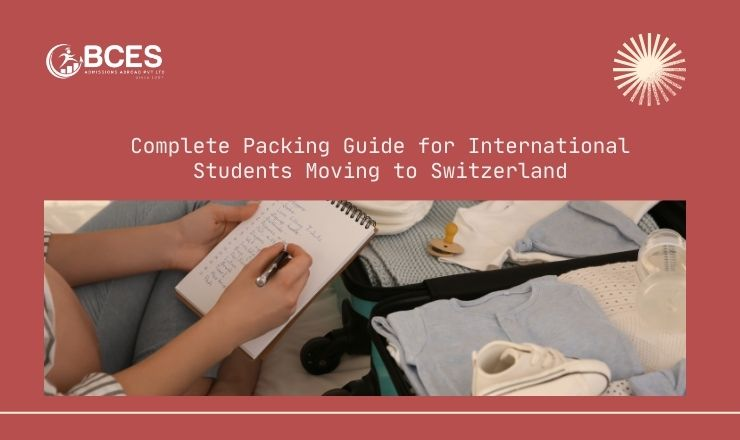Complete Packing Guide for International Students Moving to Switzerland

23 August 2025
Switzerland is the ultimate dream for most students globally. From its mesmerizing landscapes, quality education system, and international brand for innovation, it is one of the best places for international students to be. But first, you must get to enjoy it all—life in Zurich, Geneva, or Lausanne—by preparing one essential aspect: packing.
Packing for an international move is more than just filling a suitcase; it’s about being smart, practical, and prepared for a completely new lifestyle. Switzerland has four distinct seasons, each with its own demands, and as a student, your budget will matter too. Bringing the right essentials from home not only saves money but also makes settling in much easier.
Most students either overpack or leave key things behind when they move abroad. The aim should be equilibrium. You don’t have to take everything, but you must ensure the essentials are taken care of—academic papers, clothes suitable for the climate, electronics, and some personal things to remind you of home. With proper preparation, you’ll arrive ready to concentrate on your studies rather than worrying about what you didn’t bring.
What to Pack for Studying in Switzerland
Your documents are the most important items. Keep your passport, visa approval, admission letter, proof of accommodation, health insurance, and financial records safely organized in a travel folder. These are essential for university registration, immigration, and even opening a local bank account.
Clothing is next. Because Switzerland experiences a cold winter, mild spring, warm summer, and colorful fall, you should pack for all four. A good winter coat, boots, sweaters, and thermals are essentials for colder weather, whereas light and comfortable shoes as well as shoes will be good enough for summer. Outdoor culture is also very popular in Switzerland, so a nice pair of walking shoes will prove to be very helpful.
Electronics are a must. Pack a solid laptop, universal power cords, and an unlocked phone. Yes, you can purchase these in Switzerland, but buying them in advance typically costs less.
Essential daily items must not be forgotten. Toiletries, medications, and basic kitchen essentials such as spices or pre-cooked food can ease the initial weeks. Although Switzerland boasts international brand supermarkets, bringing limited amounts from home keeps one comfortable as one gets used to a foreign food culture.
Health is no less crucial. Although Switzerland boasts of a very good health care system, having a personal medical kit and prescription drugs allows you to manage minor ailments without worrying.
Why Packing Wisely Matters
Living in Switzerland is one of the most costly lifestyles in Europe, and restocking forgotten essentials can be costly. Careful packing saves you money and time and provides you with mental peace. Having all you need already with you, you can then concentrate on developing new friendships, enjoying the culture, and performing well at school.
At BCES Admissions Abroad, we understand that studying abroad is not only about getting a university seat. It’s about beginning on the right note. That is why we assist not just with admissions and visas but also offer real advice for a hassle-free transition to life overseas. With this guidebook, you will be in a better position to start your study life in Switzerland with confidence. For customized guidance in your education abroad, get in touch with BCES Admissions Abroad at +91 8800096600.
Frequently Asked Questions (FAQs)
Yes, but it is more expensive than in most countries. It is more economical to bring essential items such as winter clothing, electrical goods, and medicines from your home country.
Airlines typically permit one to two check-in baggage and a cabin bag, subject to the type of ticket you hold. Always check baggage allowance prior to your journey.
Yes, it is necessary to carry at least one good-quality winter coat and inner warm layers with you. Other garments can be purchased after sampling local climatic conditions.
Yes, big cities have Indian and Asian shops. But taking small quantities of spices or pre-cook food can help at the initial stages.
Take some Swiss Francs for your initial days. Otherwise, you can make most payments through debit or credit cards as Switzerland is very cashless.